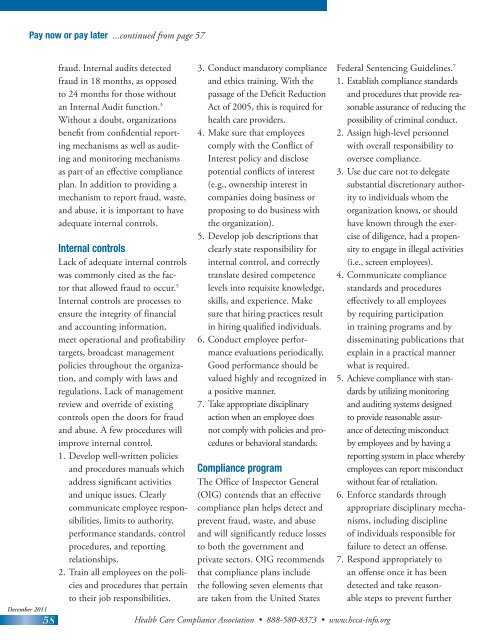Quality of the estimate. December, p. 47 - Health Care Compliance ...
Quality of the estimate. December, p. 47 - Health Care Compliance ...
Quality of the estimate. December, p. 47 - Health Care Compliance ...
Create successful ePaper yourself
Turn your PDF publications into a flip-book with our unique Google optimized e-Paper software.
Pay now or pay later ...continued from page 57<br />
<strong>December</strong> 2011<br />
58<br />
fraud. Internal audits detected<br />
fraud in 18 months, as opposed<br />
to 24 months for those without<br />
an Internal Audit function. 5<br />
Without a doubt, organizations<br />
benefit from confidential reporting<br />
mechanisms as well as auditing<br />
and monitoring mechanisms<br />
as part <strong>of</strong> an effective compliance<br />
plan. In addition to providing a<br />
mechanism to report fraud, waste,<br />
and abuse, it is important to have<br />
adequate internal controls.<br />
Internal controls<br />
Lack <strong>of</strong> adequate internal controls<br />
was commonly cited as <strong>the</strong> factor<br />
that allowed fraud to occur. 5<br />
Internal controls are processes to<br />
ensure <strong>the</strong> integrity <strong>of</strong> financial<br />
and accounting information,<br />
meet operational and pr<strong>of</strong>itability<br />
targets, broadcast management<br />
policies throughout <strong>the</strong> organization,<br />
and comply with laws and<br />
regulations. Lack <strong>of</strong> management<br />
review and override <strong>of</strong> existing<br />
controls open <strong>the</strong> doors for fraud<br />
and abuse. A few procedures will<br />
improve internal control.<br />
1. Develop well-written policies<br />
and procedures manuals which<br />
address significant activities<br />
and unique issues. Clearly<br />
communicate employee responsibilities,<br />
limits to authority,<br />
performance standards, control<br />
procedures, and reporting<br />
relationships.<br />
2. Train all employees on <strong>the</strong> policies<br />
and procedures that pertain<br />
to <strong>the</strong>ir job responsibilities.<br />
3. Conduct mandatory compliance<br />
and ethics training. With <strong>the</strong><br />
passage <strong>of</strong> <strong>the</strong> Deficit Reduction<br />
Act <strong>of</strong> 2005, this is required for<br />
health care providers.<br />
4. Make sure that employees<br />
comply with <strong>the</strong> Conflict <strong>of</strong><br />
Interest policy and disclose<br />
potential conflicts <strong>of</strong> interest<br />
(e.g., ownership interest in<br />
companies doing business or<br />
proposing to do business with<br />
<strong>the</strong> organization).<br />
5. Develop job descriptions that<br />
clearly state responsibility for<br />
internal control, and correctly<br />
translate desired competence<br />
levels into requisite knowledge,<br />
skills, and experience. Make<br />
sure that hiring practices result<br />
in hiring qualified individuals.<br />
6. Conduct employee performance<br />
evaluations periodically.<br />
Good performance should be<br />
valued highly and recognized in<br />
a positive manner.<br />
7. Take appropriate disciplinary<br />
action when an employee does<br />
not comply with policies and procedures<br />
or behavioral standards.<br />
<strong>Compliance</strong> program<br />
The Office <strong>of</strong> Inspector General<br />
(OIG) contends that an effective<br />
compliance plan helps detect and<br />
prevent fraud, waste, and abuse<br />
and will significantly reduce losses<br />
to both <strong>the</strong> government and<br />
private sectors. OIG recommends<br />
that compliance plans include<br />
<strong>the</strong> following seven elements that<br />
are taken from <strong>the</strong> United States<br />
<strong>Health</strong> <strong>Care</strong> <strong>Compliance</strong> Association • 888-580-8373 • www.hcca-info.org<br />
Federal Sentencing Guidelines. 7<br />
1. Establish compliance standards<br />
and procedures that provide reasonable<br />
assurance <strong>of</strong> reducing <strong>the</strong><br />
possibility <strong>of</strong> criminal conduct.<br />
2. Assign high-level personnel<br />
with overall responsibility to<br />
oversee compliance.<br />
3. Use due care not to delegate<br />
substantial discretionary authority<br />
to individuals whom <strong>the</strong><br />
organization knows, or should<br />
have known through <strong>the</strong> exercise<br />
<strong>of</strong> diligence, had a propensity<br />
to engage in illegal activities<br />
(i.e., screen employees).<br />
4. Communicate compliance<br />
standards and procedures<br />
effectively to all employees<br />
by requiring participation<br />
in training programs and by<br />
disseminating publications that<br />
explain in a practical manner<br />
what is required.<br />
5. Achieve compliance with standards<br />
by utilizing monitoring<br />
and auditing systems designed<br />
to provide reasonable assurance<br />
<strong>of</strong> detecting misconduct<br />
by employees and by having a<br />
reporting system in place whereby<br />
employees can report misconduct<br />
without fear <strong>of</strong> retaliation.<br />
6. Enforce standards through<br />
appropriate disciplinary mechanisms,<br />
including discipline<br />
<strong>of</strong> individuals responsible for<br />
failure to detect an <strong>of</strong>fense.<br />
7. Respond appropriately to<br />
an <strong>of</strong>fense once it has been<br />
detected and take reasonable<br />
steps to prevent fur<strong>the</strong>r

















